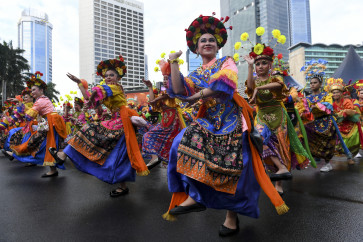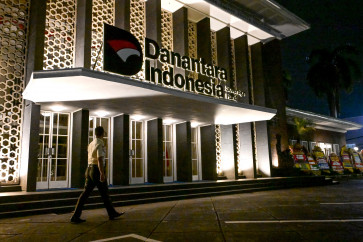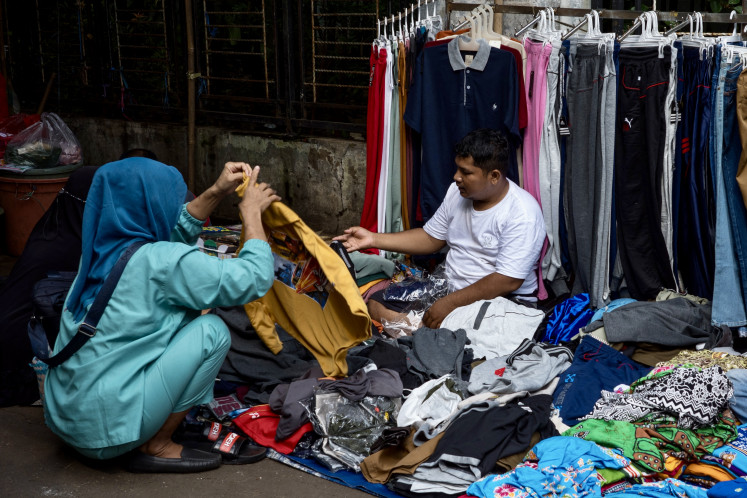Popular Reads
Top Results
Can't find what you're looking for?
View all search resultsPopular Reads
Top Results
Can't find what you're looking for?
View all search resultsGabriela Uran: A messenger of ancestral wisdom
JP/Markus MakurA loud, commanding voice rang out from a petite lady who led a group of women clad in traditional songke sarongs staging a protest in Labuan Bajo, West Manggarai regency in East Nusa Tenggara
Change text size
Gift Premium Articles
to Anyone
JP/Markus Makur
A loud, commanding voice rang out from a petite lady who led a group of women clad in traditional songke sarongs staging a protest in Labuan Bajo, West Manggarai regency in East Nusa Tenggara.
The woman, Gabriela Uran, is an activist with the Alliance of Indonesian Independent Women (APIR). Together they were demanding the government revoke mining permits in the region.
The protest was not her first. She has been fighting against the exploitation of her ancestral land since 1991.
Gabriela explained that due to its topography and geographical location, West Manggarai was an agrarian region.
The people, she said, lived by farming, husbandry and fishing and had been able to send their children to study overseas on the back of these activities.
Farming does no harm to nature, while it is feared that mining activity not only exploits the land but also damages it.
'Another reason to oppose mining operations here is that the population is growing and people need more land to live on. Moreover, East Nusa Tenggara constitutes small islets that stretch out into the Ring of Fire,' she argued, referring to the earthquake-prone location.
Gabriela could cite scientific research on the effect of soil exploitation, but her main argument is based on the local wisdom that has been passed down for generations.
'I'm a daughter of a farmer and I don't understand the law. But I carry a message from my ancestors: 'Man must not destroy the natural environment',' said Gabriela who is also director of Yayasan Komodo Indonesia Lestari (Yakines), a foundation focused on nature preservation in the region famous as the home of the Komodo dragon.
'In the end, it's the people who will suffer the most when their environment is damaged by mining operations.'
The outspoken woman said that some mining companies had started to explore potential sites for minerals and natural gas in local villages.
In her long struggle, the mother of two has often stood face-to-face with the authorities, including a regent who issued a permit for mining operations.
Born in Lembata regency, the 47-year-old wife of West Manggarai native Aloysius Simus decided to work from the periphery.
Her foundation has been working with local leaders and elders at the village level to empower the villagers, especially the women.
She founded Yakines after working for 10 years as a staffer at the Yayasan Tana Nua NGO in Sumba, which was involved in environmental preservation, forest conservation and husbandry; and then at Yayasan Tana Ai Maumere which works for forest conservation and the empowerment of women.
In its early years, the self-funded Yakines focused its work on the Mbeliling forest in the Golo Manting, Golo Sengan and Liang Ndara villages in Sano Nggoang district.
In 2001, Yakines worked with VECO Indonesia, an NGO which is active in sustainable agricultural chain development, in land and forest conservation and women's empowerment, encouraging villagers to plant trees around the protected forest.
'In eight years, our work has expanded to cover 16 villages. In 2009 we formed the Alliance of Mbeliling Indigenous Communities [AMAL] to save the protected forest from illegal logging.'
The communities later formed an assembly of local leaders called Nempung Cama Riang Puar ' literally meaning sitting together to protect the forest ' that actively engages local villagers to conserve the Mbeliling forest.
'The community also organizes workshops on environment preservation around the forest,' said Gabriela.
These communities together with Yakines formed the Conservation Development Group (CDG) the leaders of which in every village are women.
The group protects wells and builds granaries for local varieties of rice seeds. It also trains the women to be able to speak in public.
Together with the group, Gabriela formed the Lembor Paddy Alliance (APL) which developed Wojalaka rice seedlings, originally from Lembor district, to keep the variety from extinction.
She said she was proud that one of the women from Pasat village in Lembor, Sisilia Nimbus, had received an award from SCTV in 2012 for her work in preserving the environment.
'Another achievement was that of Aventinus Sadip from Paku village in Sano Nggoang who planted thousands of trees around the forest,' she said.
Gabriela also initiated a forum involving the women and local leaders which they named Riang Tana Tiwa Lami Tana Daging which means 'protecting the ancestral soil'.
The community forum has encouraged women to hold positions in the village administration while empowering widows and the elderly.
It also made a commitment to impose sanctions on villagers who bring in mining investors to their village. When a violation occurs, the village has the right to expel the violator and take over their assets and land.
'Another interesting commitment made in the forum is that all children have to be able to graduate from high school so that the village can have a better future,' Gabriela said.
Despite her achievements, Gabriela has declined to claim them as her own and instead says that the work at hand is far from done.
'My commitment is to see the women of Greater Manggarai rise as leaders in the villages or in the traditional councils. I want them to be able to raise their voices and speak about their rights which have long been ignored, because it is the women who protect the traditions and nature.'










